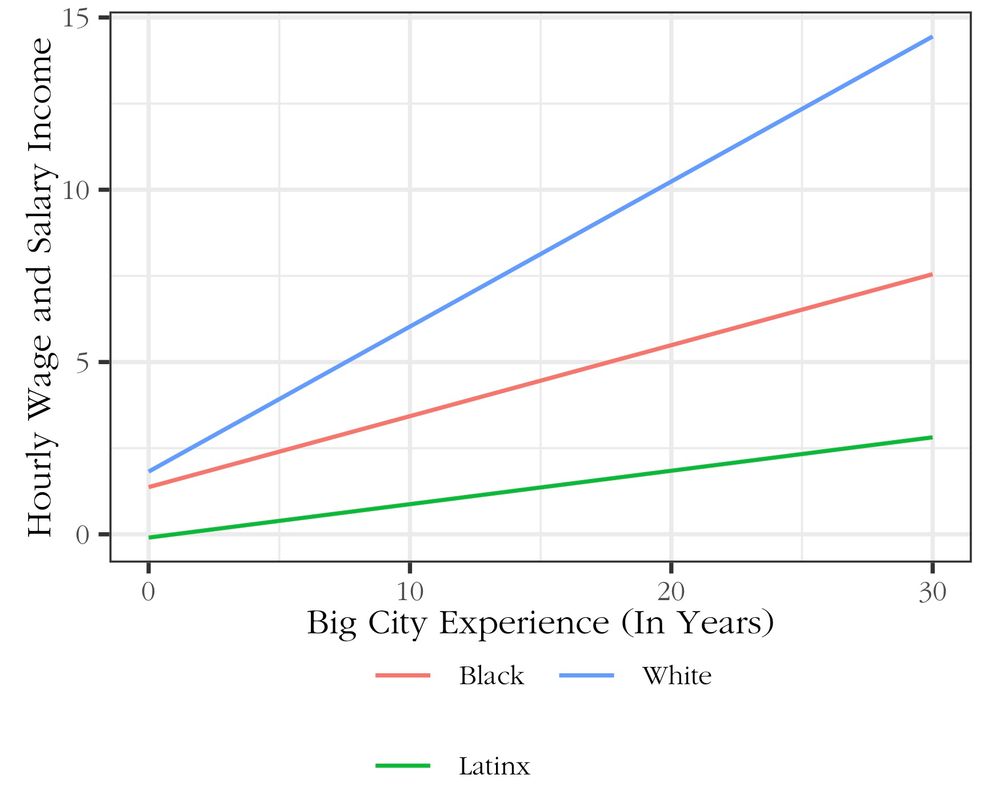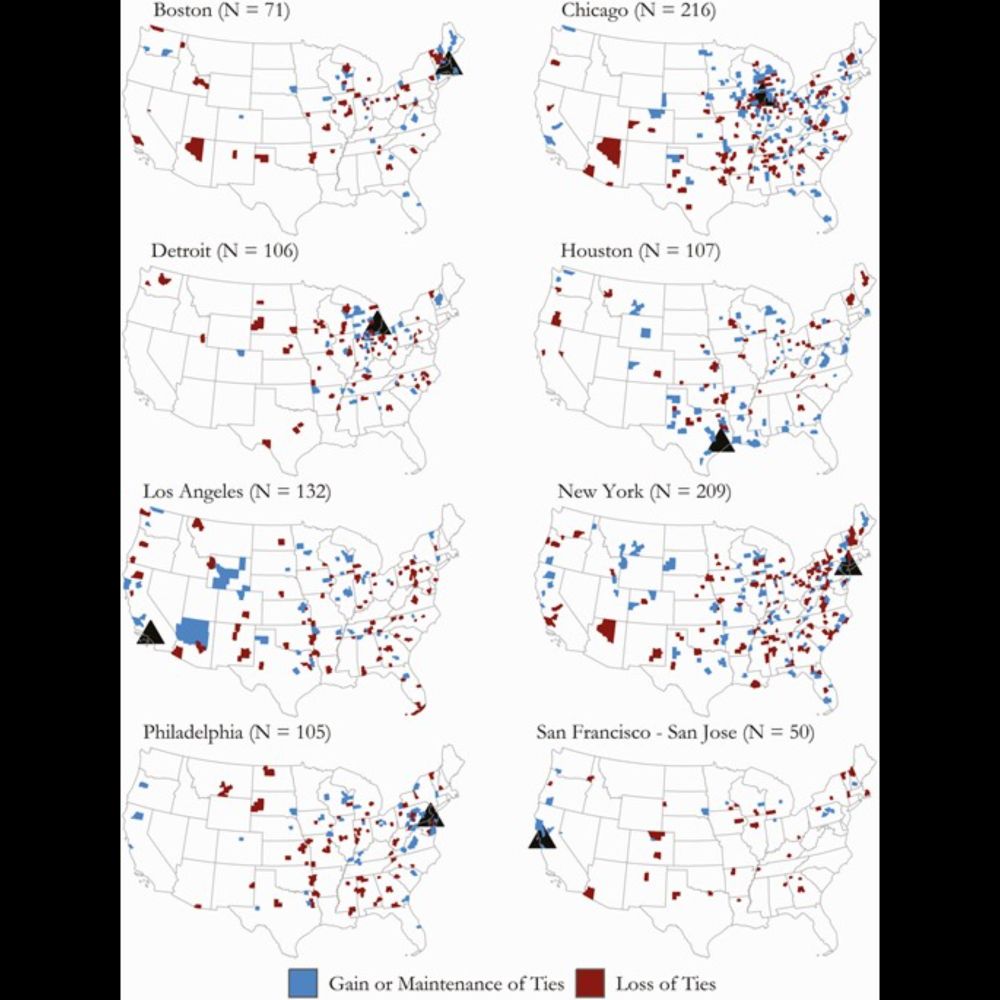
The graph plots race-specific slopes and intercepts for the economic returns of work experience in a large urban area.
Workers in large cities can use their experience to secure successively better jobs. Yet wages of minority workers increased only 25–50% as much as the wages of White workers for each additional year of work experience in large urban areas. In PNAS: www.pnas.org/doi/10.1073/...
18.02.2025 18:12 — 👍 4 🔁 2 💬 0 📌 0
My new research in @pnas.org
The substantial economic mobility that big cities are thought to offer is very uneven across race/ethnicity. Thanks @rodriguez-pose.bsky.social!
18.02.2025 16:42 — 👍 4 🔁 0 💬 0 📌 0
Last thing is I want to give a quick shout out to my colleagues @dyligent.bsky.social and @tkemeny.bsky.social who also just published a very similar paper. Makes me confident we're all on to something here! Links to both papers:
www.pnas.org/doi/10.1073/...
academic.oup.com/pnasnexus/ar...
05.02.2025 23:03 — 👍 2 🔁 0 💬 0 📌 0
But it's not just big cities. We find even larger inequalities in experience effects for expensive cities. This suggests high cost AND large populations come together to create particularly strong barriers to Black and Latinx workers accessing good jobs with high levels of upward mobility.
6/
05.02.2025 23:03 — 👍 0 🔁 0 💬 1 📌 0
Each year of experience in one of these occs increases White wages by 88 cents/hr, but only 46 and 61 cents for Black and Latinx workers. This is key, as it is these "high-skill" occs which often make big cities such great places for many to live (and offset high cost-of-living).
5/
05.02.2025 23:03 — 👍 0 🔁 0 💬 1 📌 0
This is largely explained by the far greater returns White workers get from working in occupations that have tasks which require high degrees of "abstract reasoning" and "cognitive skills" (often called "high-skill" occs), which are concentrated in big cities.
4/
05.02.2025 23:03 — 👍 0 🔁 0 💬 1 📌 0

For instance, for each year that a White worker works in a big city, their wages increase by about 42 cents/hr more than if they spent that time outside a big city - this number is about 21 and 10 cents for Black and Latinx workers. Over a career this means 1000s in annual wage inequality.
3/
05.02.2025 23:03 — 👍 0 🔁 0 💬 1 📌 0
We show that this is almost entirely explained by "experience effects" - the initial benefits of locating in a big city are not that different across race, but over time, White workers get much greater returns to each year they spend working in a big city than Black and Latinx workers.
2/
05.02.2025 23:03 — 👍 0 🔁 0 💬 1 📌 0

🚨 I have a new paper in @pnas.org! Big cities provide huge opportunities for workers to climb up the income ladder through their large number and diversity of jobs. Big cities also have higher racial wage inequality, which is getting worse over time.
#geosky #econsky
www.pnas.org/doi/10.1073/...
1/
05.02.2025 23:03 — 👍 13 🔁 2 💬 1 📌 0
Not sure that I necessarily think the following is the case - but couldn’t you also interpret increased household formation as evidence of adequate supply? Households increase because there are units for them to live in. Or am I missing something here?
14.09.2024 15:43 — 👍 0 🔁 0 💬 1 📌 0

Relational hinterlands in the USA have become disconnected from major global centres
Abstract. Research identifies strong concentrations of economic activity in dynamic, major city regions, whereas shifts in economic linkages between these and s
New paper! We show that since the 1990s many small US cities have become increasingly "disconnected" from major US cities (as measured by inter-firm ties). This occurred despite an overall dramatic rise in connectivity between cities. Disconnected cities are further disadvantaged in many other ways.
07.11.2023 21:49 — 👍 7 🔁 0 💬 0 📌 0
they should remind planners and policymakers that density is not inherently good - it has costs, and we need to be mindful of who bears those costs.
10.10.2023 17:58 — 👍 2 🔁 0 💬 0 📌 0

show that the relationship between changes in density and changes in inequality is higher when commute times also rise, as well as that changes in density are related to changes in commuting inequality. Should these results be taken as a case against increasing density in cities? Probably not. BUT,
10.10.2023 17:58 — 👍 0 🔁 0 💬 1 📌 0
childcare (which disproportionately falls on women) and a career in denser cities is particularly onerous. What explains these relationships? Other research points at ways in which the congestion costs of density may be primarily borne by women and non-White workers. Similarly, I
10.10.2023 17:57 — 👍 0 🔁 0 💬 1 📌 0

For race, the density-inequality relationship is primarily among workers with high-incomes, while for gender it is among women and men with low incomes. For gender, I also find density is only related to gender inequality among workers who have children, suggesting that managing
10.10.2023 17:57 — 👍 1 🔁 0 💬 1 📌 0
Very excited to have this out! I show that rising density within urban areas is strongly positively related to increases in racial and gender wage inequality, even after controlling for a bunch of stuff at the individual and city levels. #geosky #urbanism #EconSky
www.tandfonline.com/doi/full/10....
10.10.2023 17:56 — 👍 17 🔁 5 💬 1 📌 1
should remind planners and policymakers that density is not inherently good - it has costs, and we need to be mindful of who bears those costs.
10.10.2023 17:52 — 👍 0 🔁 0 💬 0 📌 0

between changes in density and changes in inequality is higher when commute times also rise, as well as that changes in density are related to changes in commuting inequality. Should these results be taken as a case against increasing density in cities? Probably not. BUT, they
10.10.2023 17:52 — 👍 0 🔁 0 💬 1 📌 0
(which disproportionately falls on women) and a career in denser cities is particularly onerous. What explains these relationships? Other research points at ways in which the congestion costs of density may be primarily borne by women and non-White workers. Similarly, I show that the relationship
10.10.2023 17:51 — 👍 0 🔁 0 💬 1 📌 0
For race, the density-inequality relationship is primarily among workers with high-incomes, while for gender it is among women and men with low incomes. For gender, I also find density is only related to gender inequality among workers who have children, suggesting that managing childcare
10.10.2023 17:51 — 👍 0 🔁 0 💬 1 📌 0
This was inspiring to read on todays Nobel winner but also a bit of an indictment of the research funding/academic hiring system here in the U.S. We miss out on a lot of brilliant people and their ideas because of how hard it is to get a permanent position.
www.nytimes.com/2021/04/08/h...
02.10.2023 14:43 — 👍 2 🔁 0 💬 0 📌 0
dad/urbanist/assoc.prof. transition design + urban studies|waseda university|Tokyo|co-learning/co-design|public spaces/spheres|urban practices/theories|place {un}making/becoming|perpetual adaption/resilience
Associate Professor, Urban and Regional Planning @ UIUC. Study economic development and land use policy. kerryfang.weebly.com
I'm also on LinkedIn https://www.linkedin.com/in/li-kerry-fang-a58517188/
Geography prof @ University of Vermont. Striving for thriving, socially just, healthy cities. Also: early 20th C. US geographies of childhood, qualitative research methods, geo-humanities. #MappingAmericanChildhoods https://blog.uvm.edu/mcope-childhoods/
Professor City and Regional Planning at the Ohio State University | Editor-in-Chief Journal of Urban Affairs |
Guerrilla Geographer. Founder and maker of #SlowWays, London #NationalParkCity & #EarthIn100Seconds. Coming soon.. Housing for Good. National Geographic Explorer.
slowways.org nationalparkcity.london danravenellison.com
#Exeter #UK
Mobility justice/transportation equity/urban planning and policy. Chicago!!! Proud union member (UIC United Faculty). Day job @ @uiccuppa.bsky.social
PhD Candidate in Politics, UC Santa Cruz -- global urban politics, urban climate governance & political economy
Professor of Political Science, University of Copenhagen. Research interests: European and Nordic Politics, Political Economy. Collector of modern ceramics, Faroese paintings and Christine Swane paintings. Lifelong fan of Bob Dylan and modernist poetry.
CUNY Graduate Center political science, sociology, Center for Urban Research. Race, ethnicity, immigration, urban politics, political geography and demography, New York in comparative perspective. Bicyclist, cook, sailor, explorer. Brooklynite.
Assistant Professor, ETH Zürich, follow us @spurethz.bsky.social. I am researching and teaching policy and planning in and of the urban
sociology phd candidate @ harvard
Professor for Urban and Regional Economics at RPTU Kaiserslautern-Landau.
I am racial and economic justice advocate with a long history of working on immigrant rights. Currently working in the field of Philanthropy.
All opinions are my own and do not represent the institution that I work.
A happy and productive PhD student, hopefully
Researcher curious about all things urban and mobilities | Postdoc for FuturMig @ IMIS (Uni Osnabrück) | Interested in citizenship from below, futures, peripheral places, autonomy-building, and place-making
Journal of European Urban Research Association (EURA) | Cross-disciplinary journal with a focus on urban studies | We publish original academic papers along with policy and practice papers
PhD student, Flâneur, Photographer and robust skeptisist. All about inequality, culture and territorio/space/place/networks. Tweeting in English, Español and Français
Former restaurant lifer, aspiring housing researcher. Trained as a social worker at Temple University, currently learning the ways of planning and spatial analytics at UPenn. You'll learn to love my never-ending questions.
I cover housing & criminal justice for nonprofit news site StreetlightNews.org in OKC. Previously: Oklahoma Watch, JXN Clarion Ledger & Amarillo Globe News. bryant@streetlightnews.org and molliebryant.70 on signal
Lecturer in Urban Planning & Placemaking at University of @Manchester.ac.uk Department of Planning, Property & Environmental Management | Urban design, planning, place & policy | Own views





